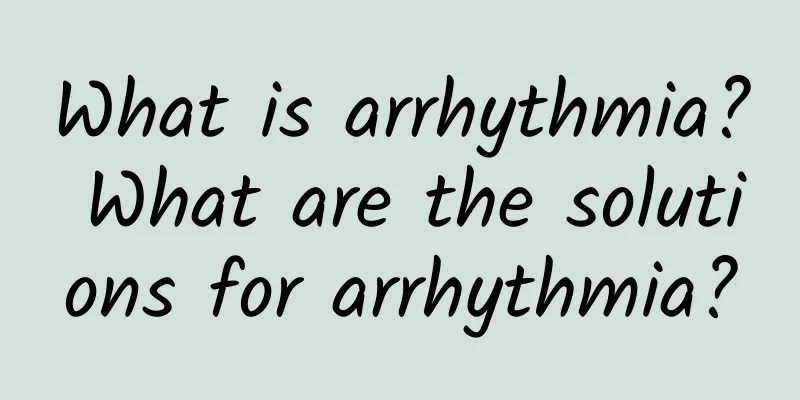What is arrhythmia? What are the solutions for arrhythmia?

|
Arrhythmia, as the name suggests, means that the heart's beating rhythm is abnormal. This medical term seems to be far away from us, but in fact, it may be a heart problem that we often encounter in our lives. So, what is arrhythmia? What are its symptoms? And how can it be treated? This article will answer these questions for you in detail. 1. What is arrhythmia? Arrhythmia refers to an abnormal rhythm or rate of the heart, which may manifest as a heartbeat that is too fast, too slow, or irregular. Normal heart rhythm is precisely controlled by the heart's electrical signal system. When this system is disturbed, arrhythmia may occur. Arrhythmia may occur sporadically or continuously, and the severity varies from person to person. 2. Symptoms of arrhythmia (1) Palpitations: This is one of the most common symptoms of arrhythmia. Patients will feel that their heartbeats are abnormal or strong, and sometimes they can even feel the "thumping" sound of their heartbeats. (2) Chest tightness or pain: Due to insufficient blood supply to the heart or abnormal heartbeat, patients may feel chest discomfort or pain. This pain may be mild or severe, and may even radiate to the arms, shoulders or back. (3) Dizziness or syncope: Arrhythmia may lead to insufficient blood supply to the brain, causing dizziness or syncope. In severe cases, the patient may suddenly lose consciousness and fall to the ground. (4) Shortness of breath: People with arrhythmia may feel shortness of breath or difficulty breathing when performing daily activities. This is because the heart cannot effectively pump enough blood to meet the body's needs. In addition, arrhythmia may be accompanied by other symptoms such as fatigue, sweating, nausea, etc. 3. Causes of arrhythmia (1) Heart disease: Coronary heart disease, valvular heart disease, cardiomyopathy and other heart diseases may lead to arrhythmia. These diseases affect the structure and function of the heart and cause abnormalities in the heart's electrical signal conduction system. (2) Metabolic abnormalities: Electrolyte imbalance (such as abnormalities in potassium, sodium, and calcium ions) and hyperthyroidism may also lead to arrhythmias. These metabolic problems can affect the electrophysiological characteristics of the heart, thereby causing arrhythmias. (3) Drug factors: Certain drugs, such as antiarrhythmic drugs, antipsychotic drugs, antidepressants, etc., may affect the conduction of electrical signals in the heart and cause arrhythmias. In addition, some illegal drugs, such as cocaine and amphetamines, may also cause arrhythmias. 4. Solutions for arrhythmias (1) Drug treatment: For mild arrhythmias, doctors may prescribe antiarrhythmic drugs to help restore the heart's normal rhythm. These drugs reduce the occurrence of arrhythmias by regulating the conduction of electrical signals in the heart. However, it should be noted that drug treatment must be carried out under the guidance of a doctor, and the side effects of the drugs must be monitored regularly. (2) Lifestyle adjustment: Improving lifestyle is one of the important measures to prevent and treat arrhythmias. Reducing mental stress, quitting smoking and limiting alcohol consumption, maintaining healthy eating habits and exercising moderately can all help reduce the frequency of arrhythmias. In addition, it is also very important to maintain a good work and rest schedule and avoid overwork and staying up late. (3) Pacemaker implantation: For patients with a slow heartbeat, doctors may recommend implanting a pacemaker. A pacemaker is a small electronic device that sends electrical signals to the heart to maintain a normal heart rate. This treatment can help patients regain their ability to live and work normally. (4) Radiofrequency ablation: Radiofrequency ablation is a commonly used method for treating arrhythmias, especially for rapid arrhythmias such as atrial fibrillation. The procedure transmits radiofrequency energy to heart tissue through a catheter, destroying the abnormal electrical signal conduction pathway that causes arrhythmias, thereby restoring the normal rhythm of the heart. Radiofrequency ablation has the advantages of less trauma and faster recovery, and has become one of the important means of treating arrhythmias. (5) Surgical treatment: In some special cases, such as abnormal heart structure or severe heart disease, surgery may be needed to treat arrhythmia. Surgical methods include heart valve repair or replacement, myocardial resection, etc., which aim to correct the structural abnormalities of the heart and restore the normal function of the heart. In conclusion, although arrhythmia is a common heart problem, it is not untreatable. By understanding the symptoms, causes and solutions of arrhythmia, we can better manage and control this disease and keep our heart healthy. At the same time, maintaining a healthy lifestyle and a positive attitude are also important measures to prevent and treat arrhythmia. Author: Yang Mengyu Cangzhou Wuqiao County People's Hospital |
<<: How to diagnose and treat coronary heart disease? Should stents be placed?
Recommend
How to care for women's breasts
Today's society is developing very fast, and ...
What is normal for fetal heart rate monitoring?
The full name of fetal heart monitoring is fetal ...
Brush your teeth right after drinking Coke? The consequences are serious! Learn about the dangers and rumors of carbonated drinks
In a busy life, leisure time is always short. Ope...
What is the cause of ovulation lower abdominal pain
Normal women ovulate every month, and some women ...
Why is the fried crispy meat not crispy enough?
We all know that fried crispy pork is a common de...
Is it gynecological inflammation if I have ulcers in my thirties?
I believe everyone knows the seriousness of acne....
What to drink to maintain the uterus
For a woman, once the uterus has a disease, it wi...
Why is the leucorrhea sticky like paste?
Leucorrhea is a normal secretion in the vagina of...
Are there any benign breast nodules of grade 4?
Breast nodule level 4 is a relatively serious con...
Lumbar pain while lying down at 29 weeks of pregnancy
As the belly grows during pregnancy, the body wil...
CNN: Survey shows more than 76% of respondents believe Facebook makes America worse
According to a new poll released by CNN on the 10...
Can I get an IUD if I have a cough?
In life, many couples will take preventive measur...
Two months abortion method
Abortion is very common. When having an abortion,...
What is abnormal vaginal bleeding
Vaginal bleeding can be divided into physiologica...
ANALYSIS GROUP: 2022 Global App Store Ecosystem Report
The App Store ecosystem facilitated $1.1 trillion...









